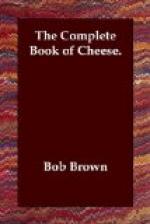[Illustration] Dr. Maginn’s Rabbit
Much is to be said in favor of toasted cheese for supper. It is the cant to say that Welsh rabbit is heavy eating. I like it best in the genuine Welsh way, however—that is, the toasted bread buttered on both sides profusely, then a layer of cold roast beef with mustard and horseradish, and then, on the top of all, the superstratum, of Cheshire thoroughly saturated, while, in the process of toasting, with genuine porter, black pepper, and shallot vinegar. I peril myself upon the assertion that this is not a heavy supper for a man who has been busy all day till dinner in reading, writing, walking or riding—who has occupied himself between dinner and supper in the discussion of a bottle or two of sound wine, or any equivalent—and who proposes to swallow at least three tumblers of something hot ere he resigns himself to the embrace of Somnus. With these provisos, I recommend toasted cheese for supper.
The popularity of this has come down to us in the succinct summing-up, “Toasted cheese hath no master.”
The Welsh original became simple after Dr. Maginn’s supper sandwich was served, a century and a half ago; for it was served as a savory to sum up and help digest a dinner, in this form:
After-Dinner Rabbit
Remove all crusts from bread slices, toast on both sides and soak to saturation in hot beer. Melt thin slices of sharp old cheese in butter in an iron skillet, with an added spot of beer and dry English mustard. Stir steadily with a wooden spoon and, when velvety, serve a-sizzle on piping hot beer-soaked toast.
While toasted cheese undoubtedly was the Number One dairy dish of Anglo-Saxons, stewed cheese came along to rival it in Elizabethan London. This sophisticated, big-city dish, also called a Buck Rabbit, was the making of Ye Olde Cheshire Cheese on Fleet Street, where Dr. Johnson later presided. And it must have been the pick of the town back in the days when barrooms still had sawdust on the floor, for the learned Doctor endorsed old Omar Khayyam’s love of the pub with: “There is nothing which has been contrived by man by which so much happiness is produced as by a good tavern.” Yet he was no gourmet, as may be judged by his likening of a succulent, golden-fried oyster to “a baby’s ear dropped in sawdust.”
Perhaps it is just as well that no description of the world’s first Golden Buck has come down from him. But we don’t have to look far for on-the-spot pen pictures by other men of letters at “The Cheese,” as it was affectionately called. To a man they sang praises for that piping hot dish of preserved and beatified milk.
Inspired by stewed cheese, Mark Lemon, the leading rhymester of Punch, wrote the following poem and dedicated it to the memory of Lovelace:




